| 2015 Q2 | story by TARA TRENARY | photos by STEVEN HERTZOG |
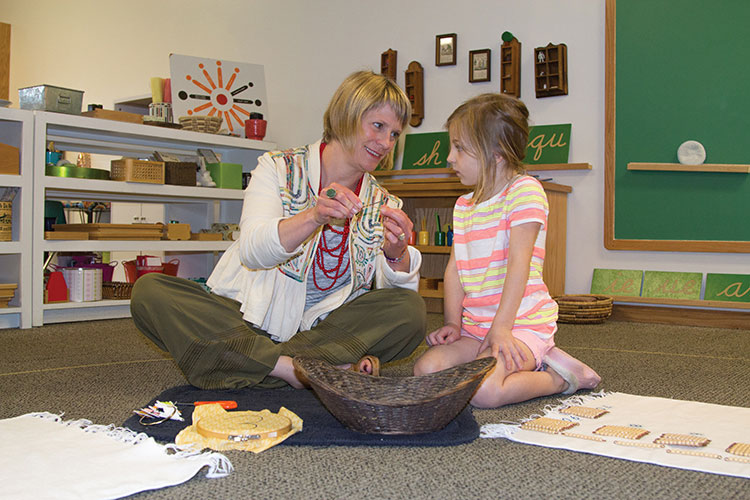
Raintree Montessori School
Preparing young minds for future challenges and opportunities is a tough job. Our economic future depends on the next generation and the foundation parents and the community provide early on. How do parents offer the best start possible to ensure their children become thriving, independent adults ready to take on this ever-changing world?
There has long been debate about the importance of early-childhood education, with some questioning how beneficial formal learning is for younger children. Various studies, including the 40-year High/Scope Perry Study (began in the 1960s) and the ongoing Carolina Abecedarian Study (begun in 1972), have shown that a quality early education greatly benefits all children by the time they head to “regular” school and well beyond. These studies also show a positive economic impact on both the families of the children attending preschools and on the economy as a whole.
Many local early-childhood educators agree children taught at a young age can benefit in many ways: They have improved social skills, are better prepared for a traditional school setting, are more equipped to learn, achieve higher grades, develop enhanced attention spans and, in general, are better behaved. And some researchers have discovered that young children participating in preschool programs are more likely to graduate from high school and go to college, less likely to become involved in crime during adolescence and young adulthood, and will have fewer behavioral issues.
No matter how you view the importance of early-childhood education, educators agree children benefit from receiving some form of education during their early development years. The specific form of instruction best suited for your child, however, may differ from that of others. Through experience, knowledge of your child’s personality and learning style, and a little research into what is offered in the Lawrence community, you can find the right program for your child.
“Parents need to be as informed as possible as to the options that are out there,” says Jon Stutler, principal of Century School, a private school for children aged three through 12. “We want to make sure we are the appropriate place for that student.”
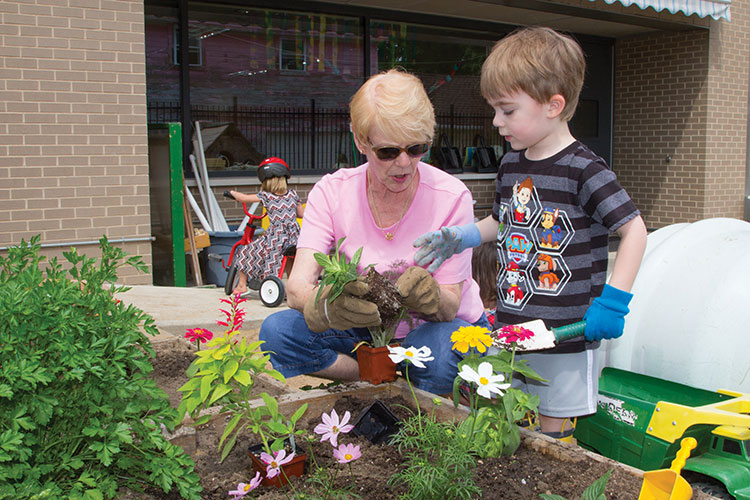
Allison Haworth with Henry Walkiewicz, planting flowers at the Lawrence Arts Center Preschool.
Century School’s preschool approach is very personal, explains Preschool Director Sara Rowden. She says that her preschool teaches children the basics, such as reading, math, language, independence, safety and social skills, and art, but its approach is individualized to meet the specific needs of each child.
“No two children learn the same, so no two children are taught the same,” she says. “We are just as dynamic in our approach as the child is dynamic.”
Other Lawrence preschool administrators agree there’s no one-size-fits-all program.
“Montessori preschool classrooms are ‘prepared environments’ filled with concrete materials offering optimum conditions for learning,” says Lleanna McReynolds, Head of School at Raintree Montessori, speaking about the school’s multisensory approach, not unlike a one-room schoolhouse, where children are surrounded by classmates getting lessons on an array of subjects at more and more advanced levels.
In a Montessori program, children work at their own pace, independently learning concepts from materials designed for self-correction and physical exploration. This unique approach to learning is designed to develop a child’s intellectual, physical and psychological abilities through self-motivation with little or no adult intervention.
“A student will advocate for themselves and then maybe, just maybe, change the world,” McReynolds says.
Students changing the world is a goal toward which early-childhood educators strive, though many approach it in different ways.
Prairie Moon Waldorf School starts with a nurturing, homelike environment, teaching not only academic skills but also artistic and practical skills, all the while honoring spirit, cultivating freedom and fostering harmony with the natural world.
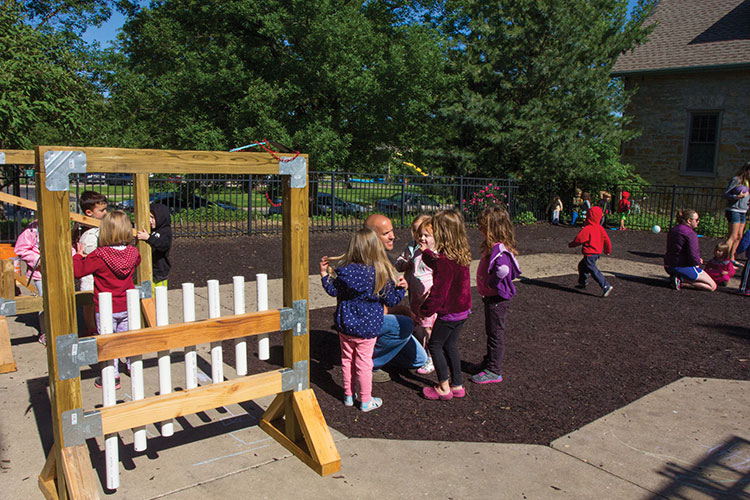
Century School
“It’s about being a whole child; feed the mind, body and soul,” explains Lauren King, Prairie Moon Development Coordinator. “That’s really what we strive to do.”
At Prairie Moon, the preschool is designed to provide a comfortable transition from home life to school life. Students start their day outdoors in the school’s gardens, where they are encouraged to explore, climb trees and get dirty. When they move indoors, teachers use oral storytelling, not books, to tell students stories. Throughout the day, students practice art and movement, all the while following a schedule that remains constant. And daily transitions are always done in song.
“Here, we feel children should experience a daily ‘rhythm,’” King continues. “It’s more of an experiential education.”
Educators agree preschool is all about the “experience” for children, and each preschool has a different approach when it comes to how a child receives his or her preschool education.
As Fred Rogers once said, “Play is really the work of childhood,” and the Lawrence Arts Center (LAC) preschool takes this idea to heart.
“We play, and that is just what we do,” says Linda Reimond, LAC Preschool Director. “That is part of our philosophy.”
She says their instruction includes a lot of open-ended activities and discovery without time limits.
“[Children] do it themselves,” she says. “There’s not a right or wrong way; when they show interest, they’re allowed freedom to work with it.”
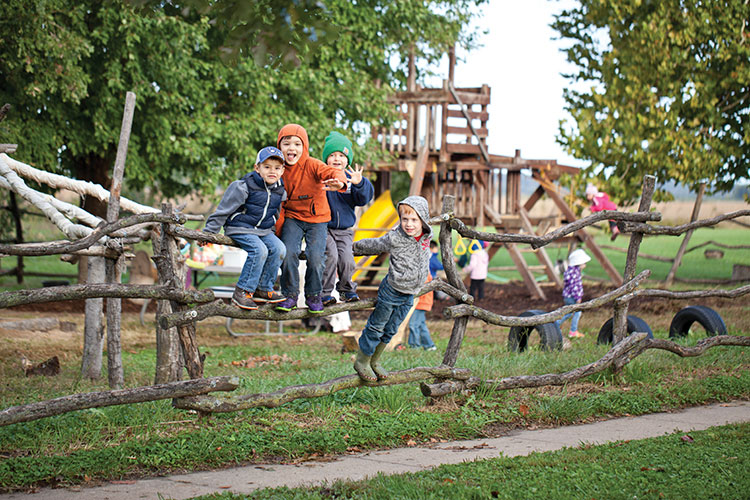
Prairie Moon
There’s also no written curriculum at LAC. As long as there’s a creative aspect to it, teachers can use it to teach their children. Some LAC teaching tools include: a writing center with different ways to “write” using things other than pencils, such as a spray bottle full of paint, and a junk box area with a variety of everyday items for children to explore.
LAC also incorporates artistic activities to teach basic skills, such as reading, writing, math and science, which include creative movement, music, drama and dance.
“It’s a lot of discovering instead of telling,” Reimond says.
Lawrence Community Nursery School (LCNS) also believes in the power of play, with a focus on social and emotional development, and with the help of parents and the community.
The “Little Red School House,” as it is known, is the second-oldest cooperative preschool in the country and the first integrated preschool in the U.S. As a cooperative, parents share in the planning and implementation of the school programs and work alongside school officials to help the school run efficiently. Not only do parents work in classrooms with teachers and students, they also clean the school, maintain the grounds and serve on committees and the school board.
“This is definitely that feeling of, ‘It takes a village to raise a kid,’” says Stephanie Duncan, LCNS Director and Lead Teacher. “It’s like a big family here. Kids excel because they have so much support.”
There are myriad preschool choices in Lawrence with very different philosophies and styles, but what’s the best choice economically for local families?
“We try to help everyone,” Duncan says. She says her preschool allots five percent of its projected tuition income for scholarships but explains it is already affordable because of parent contributions, including snacks, cleaning services, maintenance help, etc.
Reimond says 15 to 20% of the LAC students overall, not just preschool students, receive some sort of financial aid, which comes from personal and business donations, the City of Lawrence and sponsorships and fundraisers, including concerts and a yearly “Dinner Under the Stars.” More than $100,000 is allotted per year for scholarships.
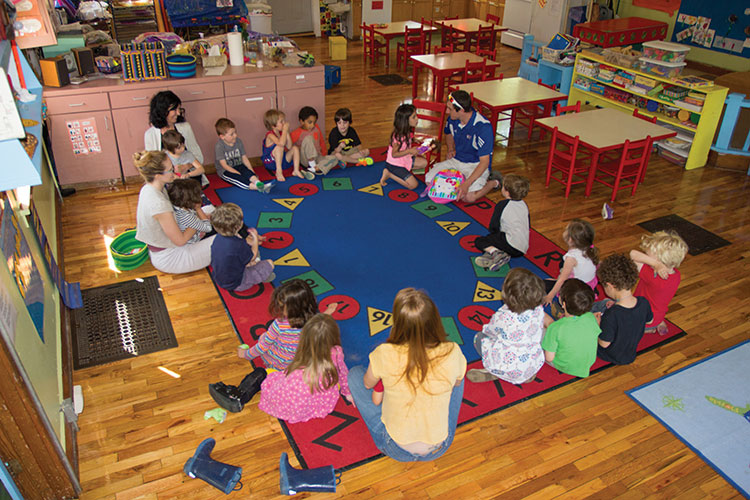
Lawrence Community Nursery School, also known as the “Little Red School House.”
“Although we are a private school, we’d like to remain as financially accessible as possible so as to be socio-economically diverse,” Prairie Moon’s Administrator Melissa Watson says.
Prairie Moon has a tuition-assistance program put together by its board, and money is raised throughout the year to support this program and others. For preschool children, Prairie Moon offers up to 20% off tuition for families that qualify. The school is also a Department for Children and Families (DCF) Child Care Subsidy provider.
“As we grow, more funds open up,” King explains.
Raintree Montessori, “charges much less than what most Montessori schools charge in other cities of comparable size,” McReynolds explains.
She says from its inception in 1978, working families have been the focus. The school charges about half the amount of tuition that most Montessori schools charge, she explains. And it does have an emergency program set up to help current Raintree families in financial crisis.
Though Century School does not currently have a tuition-assistance program, it is something administrators aspire to gain in the future. The school does have an account earmarked for future scholarships when enough money is raised.
Learning the social skills needed to succeed later in life is one of the most important parts of this early education, not to mention enhanced communication skills and emotional development. For children to excel later in life, a path must be paved for them early by their families and their communities. And preschool can be a big part of this early foundation.
“Children learn more in the first five years of their life than any other five-year period,” LAC’s Reimond concludes. “We are very fortunate in Lawrence because there’s a wide array of philosophies. We all want to help make children the best 3-, 4- or 5-year-old they can be.”

3 Comments
PredniPharm: prednisone over the counter uk – prednisone in uk
https://semaglupharm.com/# half life of semaglutide
Crestor mail order USA: CrestorPharm – Safe online pharmacy for Crestor